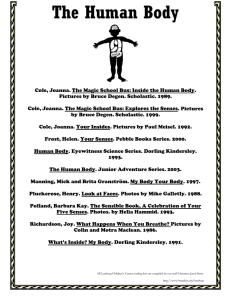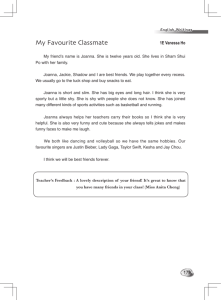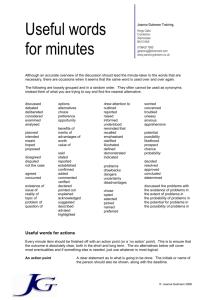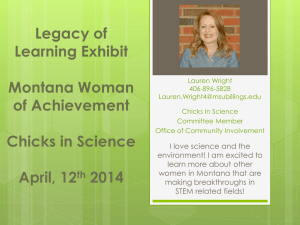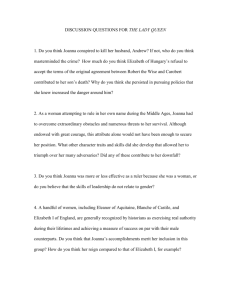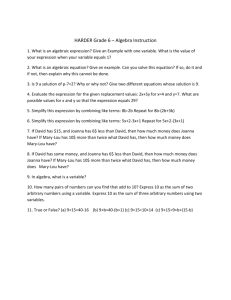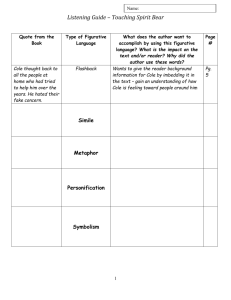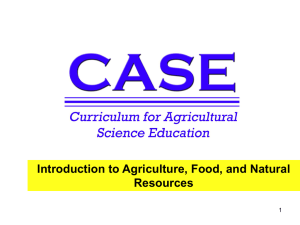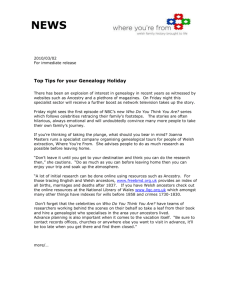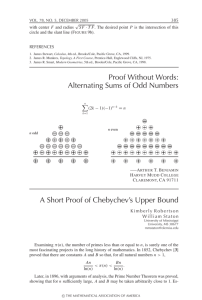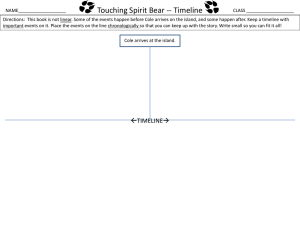Project Plan - Rocky Point Schools
advertisement
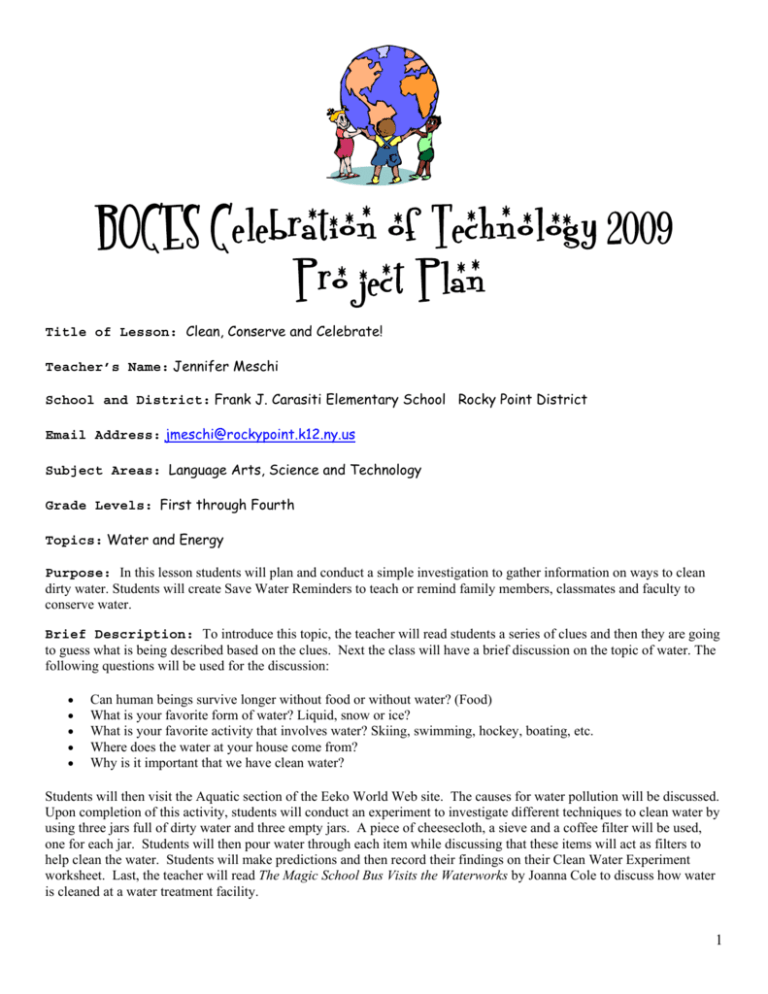
BOCES Celebration of Technology 2009 Project Plan Title of Lesson: Clean, Conserve and Celebrate! Teacher’s Name: Jennifer Meschi School and District: Frank J. Carasiti Elementary School Rocky Point District Email Address: jmeschi@rockypoint.k12.ny.us Subject Areas: Language Arts, Science and Technology Grade Levels: First through Fourth Topics: Water and Energy Purpose: In this lesson students will plan and conduct a simple investigation to gather information on ways to clean dirty water. Students will create Save Water Reminders to teach or remind family members, classmates and faculty to conserve water. Brief Description: To introduce this topic, the teacher will read students a series of clues and then they are going to guess what is being described based on the clues. Next the class will have a brief discussion on the topic of water. The following questions will be used for the discussion: • • • • • Can human beings survive longer without food or without water? (Food) What is your favorite form of water? Liquid, snow or ice? What is your favorite activity that involves water? Skiing, swimming, hockey, boating, etc. Where does the water at your house come from? Why is it important that we have clean water? Students will then visit the Aquatic section of the Eeko World Web site. The causes for water pollution will be discussed. Upon completion of this activity, students will conduct an experiment to investigate different techniques to clean water by using three jars full of dirty water and three empty jars. A piece of cheesecloth, a sieve and a coffee filter will be used, one for each jar. Students will then pour water through each item while discussing that these items will act as filters to help clean the water. Students will make predictions and then record their findings on their Clean Water Experiment worksheet. Last, the teacher will read The Magic School Bus Visits the Waterworks by Joanna Cole to discuss how water is cleaned at a water treatment facility. 1 The second activity will involve students creating Save Water Reminders utilizing MaxShow software (MaxShow software is part of the Scholastic Keys, Tom Snyder Productions software package. This software has provided K-3 with a more user-friendly interface for PowerPoint). Upon reading Saving Water by Neil Morris, students will discuss why it is important to use less water instead of only depending on water that has been cleaned and therefore uses unnecessary electricity. Then on chart paper a list will be created of the ways students can conserve water at school and at home. Students will then type their findings into MaxShow and use the drawing tool to illustrate. The slides will be printed in color and displayed throughout the classroom. Copies will be made and send home with students. *Lesson based on EEKO World’s “The Same Old Water”. Materials Needed: • • • • • • • • • Six glass jars Magnifying glass Small amount of dirt, leaves, and/or grass Water Cheesecloth (1 small piece) Sieve Coffee filter (one) The Magic School Bus at the Waterworks by Joanna Cole Saving Water by Neil Morris Time Required: Approximately 2 weeks Explorations: Teacher Resource Books: The Earth by Teacher Created Materials Earth Science Series: Water by Sue Lambert and Sandi Rickerby Children’s Books: Taking Care of the Earth by Billy Goodman Energy makes Things Happen by Kimberly Brubaker Bradley Water by David Bennett The Magic School Bus at the Waterworks by Joanna Cole The Magic School Bus Wet All Over by Joanna Cole Let’s Explore Water by Henry Pluckrose My World of Science: Water by Angela Royston The Drop in My Drink: The Story of Water on Our Planet by Meredith Hooper Saving Water by Sharon Dalgleish Saving Water by Neil Morris Extensions: As an extension to this project, first grade students will work with a kindergarten class to collect recyclable containers that have been brought in from home. A parent and/or teacher volunteer will bring these containers to the local supermarket to return. With the money earned, students will donate to Playpumps International, an organization that provides clean water to villages in Africa. Assessment/Evaluation Tools and Opportunities: The Clean Water Experiment worksheet and individual MaxShow slides will be used as a form of assessment as well as teacher observations. 2 New York State Standards: Language Arts: Standard 1: What students do for Information and Understanding: • Read from informational texts. • Create words, phrases, and sentences that explain or describe a concept to transmit information • Write own name on written products • Listen for ideas in group discussion • Listen in order to follow directions involving a few steps • Speak in order to respond verbally to questions and/or directions Standard 2: What students do for Literary Response and Expression: • Comprehend, interpret, and respond to imaginative text • Write imaginative texts such as a sentence(s) Standard 4: What students do for Social Interaction: • Write words and pictures to maintain and enhance personal relationships • Listen during group discussions and shared writing • Speak about written experiences What students do across all four English Language Arts Standards: • Follow left to right and top to bottom direction when writing • Use spacing between words when writing on a line • Use beginning of sentence capitalization and end punctuation • Respond respectfully • Take turns speaking in a group • Stay on topic National Educational Technology Standards for Teachers: Standard 1: Facilitate and Inspire Student Learning Environments and Experiences: • Teachers use their knowledge of subject matter, teaching and learning, and technology to facilitate experiences that advance student learning, creativity, and innovation in both face-to-face and virtual environments. Standard 2: Design and Develop Digital-Age Learning Experiences and Assessments • Teachers design, develop, and evaluate authentic learning experiences and assessment incorporating contemporary tools and resources to maximize content learning in context and to develop the knowledge, skills, and attitudes identified in the NETS•S. Standard 3: Model Digital-Age Work and Learning • Teachers exhibit knowledge, skills, and work processes representative of an innovative professional in a global and digital society. Standard 4: Promote and Model Digital Citizenship and Responsibility • Teachers understand local and global societal issues and responsibilities in an evolving digital culture and exhibit legal and ethical behavior in their professional practices. Standard 5: Engage in Professional Growth and Leadership • Teachers continuously improve their professional practice, model lifelong learning, and exhibit leadership in their school and professional community by promoting and demonstrating the effective use of digital tools and resources. National Educational Technology Standards for Students: Standard 1: Creativity and Innovation: 3 • Students demonstrate creative thinking, construct knowledge, and develop innovative products and processes using technology. Standard 2: Communication and Collaboration: • Students use digital media and environments to communicate and work collaboratively, including at a distance, to support individual learning and contribute to the learning of others. Standard 3: Research and Information Fluency: • Students apply digital tools to gather, evaluate, and use information. Standard 4: Critical Thinking, Problem Solving, and Decision Making: • Students use critical thinking skills to plan and conduct research, manage projects, solve problems, and make informed decisions using appropriate digital tools and resources. Standard 5: Digital Citizenship: • Students understand human, cultural, and societal issues related to technology and practice legal and ethical behavior. Standard 6: Technology Operations and Concepts • Students demonstrate a sound understanding of technology concepts, systems, and operations. Internet Sites of Interest Related to this Topic: http://pbskids.org/eekoworld/index.html -PBS Kids: Eeko World http://www.scwa.com/ -Suffolk County Water Authority http://www.epa.gov/ogwdw/kids/flash/flash_watercycle.html -The Water Cycle http://earthguide.ucsd.edu/earthguide/diagrams/watercycle/ -Interactive Water Cycle Diagram http://www.worldwaterday.org/ -World Water Day http://www.epa.gov/region5/publications/happy/happy.htm -Happy Earth Day Coloring and Activities Book is an 11-page coloring book full of tips for making the Earth a better place. (FREE!) http://www.planetpals.com/earthday.html -Lessons and activities http://www.dltk-kids.com/crafts/earth.html -Songs and a rainforest poem. http://www.edhelper.com/EarthDay.htm -Math worksheets, word searches, vowels worksheet and additional websites. 4 http://www.squiglysplayhouse.com/Holidays/EarthDay.html -A few online games and worksheets. http://abcteach.com/directory/theme_units/month_to_month/d_april/earth_day/ -Printables http://www.atozteacherstuff.com/themes/environment.shtml -Lessons by grade level. http://www.planetpals.com/earthdayideas.html -This site offers many activities and projects. http://www.preschooleducation.com/searth.shtml -Many great Earth Day songs! http://www.perpetualpreschool.com/holiday_themes/earth_day.htm -Songs, snacks, art, science and games. http://www.first-school.ws/theme/h_earth-day.htm -Earth Day educational activities for preschool and kindergarten. You will find free printable crafts and activities with easy to follow instructions, and related resources. http://www.theteachersguide.com/earthdaylessonplans.htm -There are many great things at this site including lessons for The Lorax by Dr. Seuss http://www.education-world.com/a_lesson/lesson059.shtml -Earth Day activities http://www.ecokidsonline.com/pub/fun_n_games/index.cfm -Games, activities, printable pages and information about wildlife, science and nature, energy and environmental issues. *Images provided by Microsoft Office ClipArt. 5
